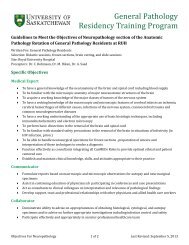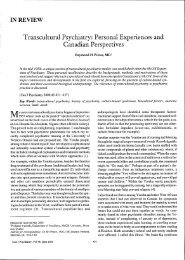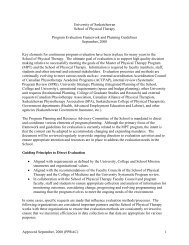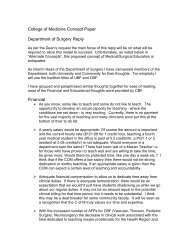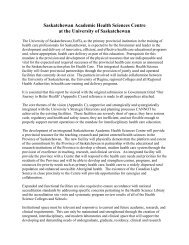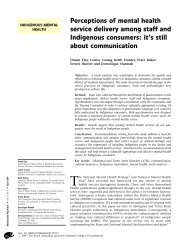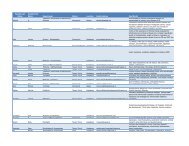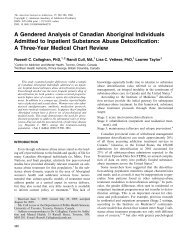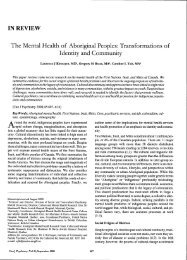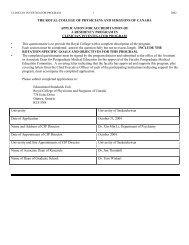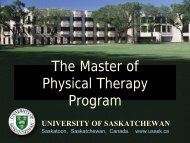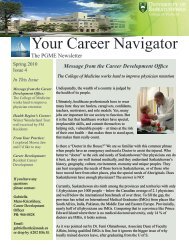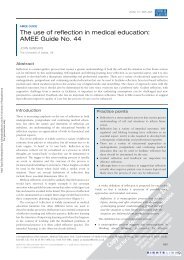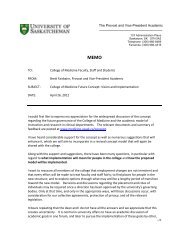COMMUNIQUé - College of Medicine - University of Saskatchewan
COMMUNIQUé - College of Medicine - University of Saskatchewan
COMMUNIQUé - College of Medicine - University of Saskatchewan
You also want an ePaper? Increase the reach of your titles
YUMPU automatically turns print PDFs into web optimized ePapers that Google loves.
esearch<br />
Heather was selected the Best Student Paper Award at the<br />
56th Annual Conference <strong>of</strong> the Canadian fertility and<br />
andrology Society. The paper, entitled ‘ A Single 20mg dose<br />
<strong>of</strong> Aromatase Inhibitor Does Not Affect Folliculogenesis<br />
in the Folliculr Phase <strong>of</strong> the Menstrual Cycle’, was co-authored<br />
with Donna Chizen an Gregg Adams.<br />
And by learning more about how estrogen encourages the<br />
growth <strong>of</strong> ovarian follicles where eggs are developed, she<br />
could help design more effective therapy for women who have<br />
difficulties conceiving.<br />
“It’s a simple study with pr<strong>of</strong>ound implications,” Pierson says.<br />
While in France, Allaway learned about space travel and planned<br />
her research so to be relevant to a career as an astronaut.<br />
“For the next generation <strong>of</strong> astronauts, NASA and the European<br />
Space Agency will be looking for physicians, scientists and<br />
engineers as well as pilots,” says Pierson. “This is what Heather<br />
is preparing for.”<br />
In 2008, Allaway went on a two-week mission at the International<br />
Mars Society Mars Desert Research Station in Utah where researchers<br />
work in a remote environment reminiscent <strong>of</strong> the red planet.<br />
Allaway sees a need for more information to educate and<br />
empower women around the world to take control <strong>of</strong> their bodies.<br />
She recruits her own research volunteers, educating them along<br />
the way about how reproduction works.<br />
“The best part <strong>of</strong> my work is getting to know the amazing women<br />
who volunteer,” Allaway says. “They give their time to learn more<br />
about a subject that is still a touchy topic to most people.”<br />
While Pierson anticipates outstanding PhD work from Allaway, he<br />
is just as optimistic about her career in space travel, noting that<br />
“farm kids have an incredible work ethic.”<br />
Graduate student Lisa Johnson wrote the above article while<br />
completing an internship at the U <strong>of</strong> S research communications<br />
<strong>of</strong>fice. Visit www.usask/research for more stories about<br />
student research. n<br />
This article recently appeared in the Saskatoon Star Phoneix.<br />
Depression, pills<br />
and Alzheimer’s disease<br />
Is our society’s love affair with antidepressants<br />
setting us up for an epidemic <strong>of</strong> early-onset<br />
Alzheimer’s disease?<br />
“Depression doesn’t necessarily cause more<br />
Alzheimer’s disease, but what it does is it<br />
causes Alzheimer’s disease to happen earlier,”<br />
says Dr. Darrell Mousseau. “Depression is<br />
doing something to the brain that makes<br />
it much more vulnerable to developing<br />
Alzheimer’s disease earlier on.”<br />
Mousseau, a pr<strong>of</strong>essor in the U <strong>of</strong> S <strong>College</strong><br />
<strong>of</strong> <strong>Medicine</strong>’s Department <strong>of</strong> Psychiatry,<br />
together with his team, has found that an<br />
enzyme that plays an important role in<br />
depression can severely weaken brain cells<br />
and perhaps trigger the processes that lead<br />
to Alzheimer’s disease. The team is also<br />
looking at the role <strong>of</strong> antidepressants in<br />
this process.<br />
“We have to be careful about what kind <strong>of</strong><br />
drugs we’re putting into depressed patients<br />
because that could actually be creating<br />
Alzheimer’s in some people,” he says.<br />
“Instead <strong>of</strong> developing it when they’re 70,<br />
maybe they’ll develop it when they’re 50 or 40.”<br />
Dr. Mousseau holds the <strong>Saskatchewan</strong><br />
Research Chair in Alzheimer’s Disease and<br />
Related Dementia. The chair is a partnership<br />
among SHRF, the Alzheimer Society <strong>of</strong><br />
<strong>Saskatchewan</strong>, and the <strong>University</strong> <strong>of</strong><br />
<strong>Saskatchewan</strong>.<br />
Each funding partner provides $100,000<br />
per year for five years, while the U <strong>of</strong> S<br />
provides the necessary infrastructure and<br />
support. It is the first chair under SHRF’s new<br />
<strong>Saskatchewan</strong> Research Chairs program.<br />
Over the next five years <strong>of</strong> his Chair’s term<br />
Mousseau and his team hope to come<br />
closer to discovering a way to provide<br />
earlier diagnostic measures and prevent<br />
Alzheimer’s disease in a significant portion<br />
<strong>of</strong> the population.<br />
As Canada’s population ages, finding the<br />
cause <strong>of</strong> and cure for Alzheimer’s disease is<br />
expected to become critically important.<br />
In its report The Rising Tide, the Alzheimer<br />
Society estimates that if nothing is done to<br />
stop or slow the disease, by the year 2038<br />
one person will develop Alzheimer’s disease<br />
or a related dementia every two minutes<br />
in Canada. n<br />
Dr. Darrell Mousseau and his team will use advanced<br />
research tools such as those at the Canadian Light<br />
Source at the <strong>University</strong> <strong>of</strong> <strong>Saskatchewan</strong> to study<br />
links among depression, antidepressant drugs, and<br />
Alzheimer’s disease.<br />
This story and photograph provided courtesy <strong>of</strong> SHRF.<br />
<strong>University</strong> <strong>of</strong> <strong>Saskatchewan</strong> • <strong>College</strong> <strong>of</strong> <strong>Medicine</strong> C O M M U N I Q U É 11



